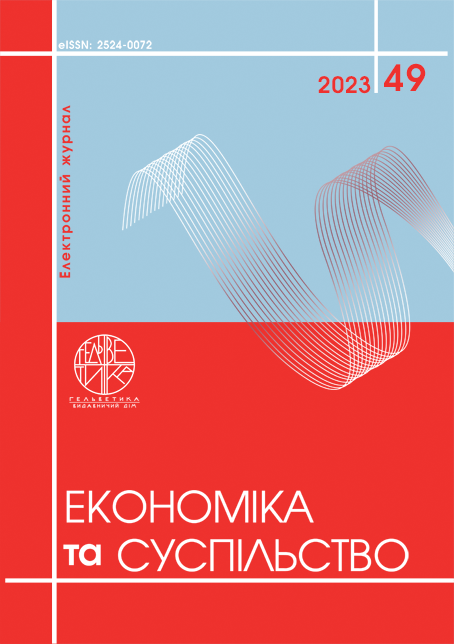DIGITAL COMPETENCES AS THE BASIS OF TRANSFORMATION OF PROFESSIONAL EDUCATION OF FUTURE MANAGERS
Abstract
The article presents the author's vision of the model of students' digital competence and reveals the content of its components. In order to specify the components of the model of students' digital competence, a theoretical analysis of domestic and foreign research was conducted. It was found that in the digital era, digital competence becomes a factor of professionalism, and its formation is an urgent task of the higher education system in the state. The article presents the results of a sociological study conducted at the Polissia National University regarding the demand and level of development of digital competence of education seekers. Respondents were full-time and part-time bachelor's and master's degree holders. The questionnaire was structured according to the following blocks: the importance of possessing digital competences in the field of future professional activity and self-assessment of the level of possession of digital competences at the time of the sociological research; general assessment of the level of mastery of the key elements of digital competence and the degree of their sufficiency; the influence of the organization of the educational process at the university on the formation of digital competences of education seekers. Based on the results of the conducted sociological research, several conclusions were made that are extremely important at all stages of the formation and implementation of the concept of the development of digital competence of education seekers. The value of digital competences for future professionals is critically high, but the actual level of possession of digital competences is lower than required by employers. The revealed trends indicate the need to improve the organization of the educational process regarding the formation of digital competence in future specialists. The established regularities of the formation of digital competences require building a new strategy for achieving the digital competence of graduates in the digital era. It is obvious that, regardless of the direction of training, curricula and the content of the educational process should include special courses on the formation of digital competence of education seekers in order to solve the complex task of integrating professional and digital competences.
References
Andriianov, O.V., Tataki, O.O. Formuvannia informatsiino-komunikatyvnoi kompetentnosti v protsesi pidhotovky fakhivtsiv dokumentno-informatsiinoi sfery [Formation of information and communication competence in the process of training professionals in the document and information sphere]. Bibliotekoznavstvo. Dokumentoznavstvo. Informolohiia, 50-55. URL: http://nbuv.gov.ua/UJRN/bdi_2016_1_9 (дата звернення 10.04.2023).
Bykova, Yu., Spirna, O. & Ovcharuk, O. Fundamentals of standardization of information and communication competences in the education system of Ukraine: [methodical recommendations]. Kyiv: Atika. 2018. 88 p.
Do digital students show an inclination toward continuous use of academic library applications? A case study. H. Rafique, R. Alroobaea, В. А. Munawar et al. The Journal of Academic Librarianship. 2020. Vol. 47, No. 2. DOI: https://doi.org/10.1016/j.acalib.2020.102298
Dufva T., Dufva M. Grasping the future of the digital society. Futures. 2019. № 107. p. 17-28.
Концепція розвитку цифрових компетентностей: Розпорядження Кабінету Міністрів України від 3 березня 2021 р. № 167 с. UPL: https://zakon.rada.gov.ua/laws/show/167-2021 (дата звернення 12.04.2023).
M. D. Díaz-Noguera, C. Hervás-Gómez, A. M. De la Calle-Cabrera, E. López-Meneses Autonomy, Motivation, and Digital Pedagogy Are Key Factors in the Perceptions of Spanish Higher-Education Students toward Online Learning during the COVID-19 Pandemic. International Journal of Environmental Research and Public Health. 2022. Vol. 19, No. 2. Art. No. 654. DOI: https://doi.org/10.3390/ijerph19020654
Y. Zhao, M. C. Sánchez Gómez, A. M. Pinto Llorente, L. Zhao Digital Competence in Higher Education: Students’ Perception and Personal Factors Sustainability. 2021. Vol. 13 (21). Art No. 12184. DOI: https://doi.org/10.3390/su132112184
Рамка цифрових компетентностей для громадян України (DigComp UA for Citizens) UPL: http://fit.univ.kiev.ua/wp-content/uploads/2020/07/DigComp-Framework-UA-for-Citizens.pdf (дата звернення 10.04.2023)
Stephanie Carretero, RiinaVuorikari, YvesPunie. DigComp 2.1: The Digital Competence Framework for Citizens with eight proficiency levels and examples of use.- Luxembourg: Publications Office of the European Union, 2017. 48 р.
Andriianov, O.V., Tataki, O.O. (2016). Formuvannia informatsiino-komunikatyvnoi kompetentnosti v protsesi pidhotovky fakhivtsiv dokumentno-informatsiinoi sfery [Formation of information and communication competence in the process of training professionals in the document and information sphere]. Bibliotekoznavstvo. Dokumentoznavstvo. Informolohiia, 50-55. Available at: http://nbuv.gov.ua/UJRN/bdi_2016_1_9 (accessed 10.04.2023).
Bykova, Yu., Spirna, O. & Ovcharuk, O. (2018). Fundamentals of standardization of information and communication competences in the education system of Ukraine: [methodical recommendations]. Kyiv: Atika. 88 p.
Do digital students show an inclination toward continuous use of academic library applications? A case study.( 2020). H. Rafique, R. Alroobaea, В. А. Munawar et al. The Journal of Academic Librarianship. Vol. 47, No. 2. DOI: https://doi.org/10.1016/j.acalib.2020.102298
Dufva T., Dufva M. (2019) Grasping the future of the digital society. Futures. № 107. p. 17-28.
The concept of the development of digital competences. (2021). Decree of the Cabinet of Ministers of Ukraine dated March 3, No. 167 p. Available at: https://zakon.rada.gov.ua/laws/show/167-2021 [in Ukrainian]
M. D. Díaz-Noguera, C. Hervás-Gómez, A. M. De la Calle-Cabrera, E. (2022). López-Meneses Autonomy, Motivation, and Digital Pedagogy Are Key Factors in the Perceptions of Spanish Higher-Education Students toward Online Learning during the COVID-19 Pandemic. International Journal of Environmental Research and Public Health. Vol. 19, No. 2. Art. No. 654. DOI: https://doi.org/10.3390/ijerph19020654
Y. Zhao, M. C. Sánchez Gómez, A. M. Pinto Llorente, L. (2021). Zhao Digital Competence in Higher Education: Students’ Perception and Personal Factors Sustainability. Vol. 13 (21). Art No. 12184. DOI: https://doi.org/10.3390/su132112184
Digital competence framework for citizens of Ukraine (DigComp UA for Citizens) .Available at: http://fit.univ.kiev.ua/wp-content/uploads/2020/07/DigComp-Framework-UA-for-Citizens.pdf [in Ukrainian]
Stephanie Carretero, RiinaVuorikari, YvesPunie. (2017). DigComp 2.1: The Digital Competence Framework for Citizens with eight proficiency levels and examples of use.- Luxembourg: Publications Office of the European Union, 48 р.

This work is licensed under a Creative Commons Attribution 4.0 International License.


